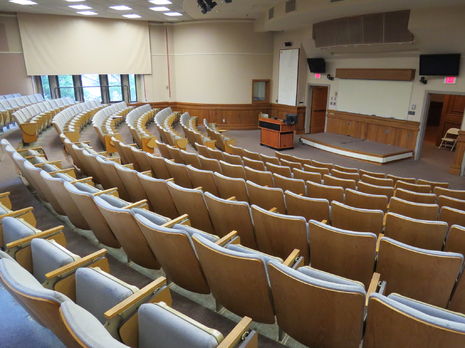“Golden opportunity”: Lecture Capture scheme to be trialed for humanities
The boards of each faculty will be able to to opt into the scheme, which has already been adopted by some STEM subjects

The University will soon give humanities and social science faculties the chance to express their interest in joining a new lecture capture scheme.
This means lecturers’ slides and voice will be recorded and uploaded to a centralised system for students to watch at their convenience.
According to School of Humanities and Social Sciences’ Undergraduate Student Representative Farid Aletomeh, who made the announcement to students last week, a university-wide lecture scheme will then be introduced in the next few years.
The scheme has been informed through a pilot already adopted by some STEM subjects.
The boards of each faculty will be given the opportunity to opt-in to the scheme by expressing their interest in three phases running from 2020-21.
However, the successful implementation of the scheme depends on faculty infrastructure, as not all University buildings are fitted with lecture capture technology.
“One of the biggest positives of the lecture capture scheme is the productivity boost for students as they can pause the lecture and think more deeply about difficult concepts,” Aletomeh told Varsity.
“Lecture capture can act as a powerful consolidation tool and revision resource, allowing for a deeper understanding of the subject material,” he added, further emphasising the greater flexibility it will give students in catching up on lectures.
Aletomeh also highlighted the benefits the scheme will have for accessibility, allowing disabled students to participate in lectures with “much greater ease and access”, while the “ability to re-watch lectures in a relaxed environment can help students with illnesses from falling behind and improve students’ mental health.”
One student from Murray Edwards college who suffers from anxiety, and has a hearing disability, welcomed the news about the potential widening of the scheme.
“During periods of bad anxiety when I don’t want to go to lectures, knowing that they are all recorded would take a lot of pressure off me,” they said.
“Because of my hearing impairment, I already have permission from the Disability Resource Centre to record lectures on my phone but the sound quality can be poor, so professional recording would be really helpful.”
But the scheme may have downsides. Aletomeh urged it “may not be appropriate for … controversial topics and small discussion circles” and the “prospect of being recorded may hinder the incentive for open discussion.”
It may also act as a disincentive for students to attend lectures if they can access them any time.
However, Aletomeh stressed, papers have come out recently debunking such concerns.
One example is a paper by Emily Nordmann, a leading academic exploring lecture capture technologies, on “the impact of attendance, lecture recording, and student attainment across four years of an undergraduate programme”.
It found “no compelling evidence for a negative effect of recording use, or that attendance and recording use were related”.
Aletomeh acknowledged that the decision to join the pilot is dependent on each Faculty’s Board.
However, he urged “if this is a technology students truly want and care about - this is the time to speak up … and through our faculty reps, take this golden opportunity to join the lecture capture conversation."
 News / University Council rescinds University Centre membership20 February 2026
News / University Council rescinds University Centre membership20 February 2026 News / Hundreds of Cambridge academics demand vote on fate of vet course20 February 2026
News / Hundreds of Cambridge academics demand vote on fate of vet course20 February 2026 News / Judge Business School advisor resigns over Epstein and Andrew links18 February 2026
News / Judge Business School advisor resigns over Epstein and Andrew links18 February 2026 News / Union cancels event with Sri Lankan politician after Tamil societies express ‘profound outrage’20 February 2026
News / Union cancels event with Sri Lankan politician after Tamil societies express ‘profound outrage’20 February 2026 News / Caius students fail to pass Pride flag proposal20 February 2026
News / Caius students fail to pass Pride flag proposal20 February 2026










